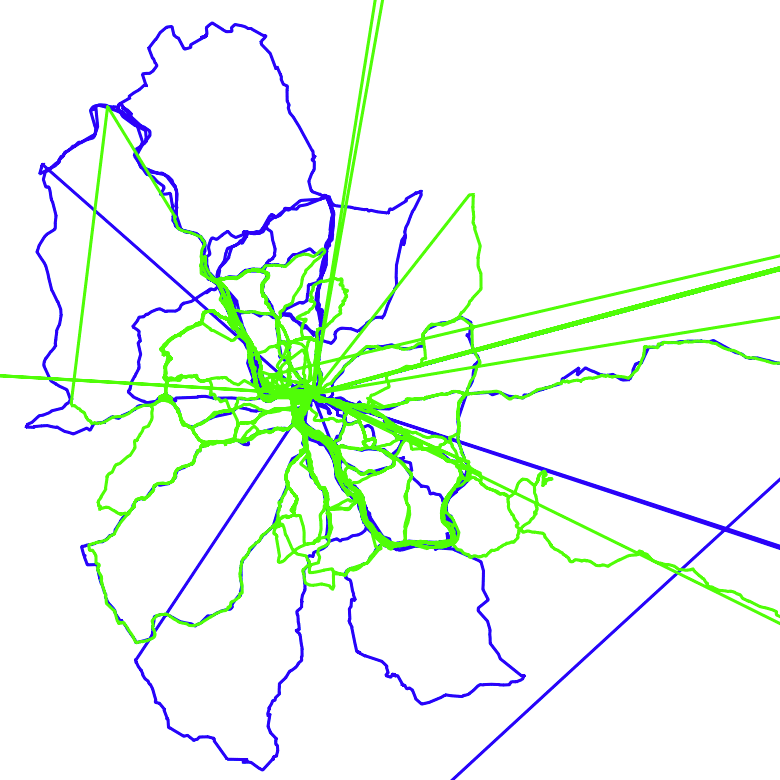No more messy GPX files!
GPSplit is a GPX toolkit that is built on top of the GPXGO library by @tkrajina.
GPSplit was motivated by a personal GPX file that spans multiple years of bike tours within a single GPX segment. This GPX file demanded a fast way of automatically splitting segments, e.g., if there is no relevant movement over longer time, if single segments are too short, if the start and end of a segment has no significant movement, or if there is a huge time / distance jump between two points.
- GPSplit provides functionality for splitting, filtering, and analyzing GPX files, tracks, and segments.
- The GPSplit command line interface allows combining multiple split / filter rules through UNIX pipes.
- GPSplit makes it easy to define custom split / filter rules.
- GPSplit can be used as a library in combination with GPXGO.
Install Go 1.22 and run
go install github.com/abzicht/gpsplitThis command splits a GPX file into multiple files. Splitting is performed, if a GPX segment has a time jump of over 8 hours between two points.
cat ./my-recording.gpx | gpsplit --out ./ split --time 8hThe gif below shows the before (two GPX segments, spanning multiple years) and
after (over 100 individual tracks) of using gpsplit.
The following command was used to obtain this result:
gpsplit -i ./my-recording.gpx split -d 5000 -t 8h --pause-split 200,1h | gpsplit filter --trim 50 | gpsplit -o ./gpx direct --simplify 40 --min-radius 1000 --min-points 80In short, this command splits a large GPX file into multiple files whenever it detects pauses and interrupts within recorded GPX segments. Furthermore, it cleans those segments up and simplifies their tracks. Finally, it removes segments that are too short.
The whole command can be broken down as follows:
gpsplit -i ./my-recording.gpxinstructsgpsplitto read from./my-recording.gpxsplit -d 5000 -t 8h --pause-split 200,1hsplits all segments that have certain jumps between consecutive points.-t 8hsplits, if the duration between two consecutive points is over 8 hours.-d 5000splits, if the distance between two consecutive points is over 5000 meters.--pause-split 200,1hsplits, if we remained within a 200 meter radius for at least 1 hour. The split is performed as soon as we leave the 200 meter radius. I.e., the detected pause remains in the first sub-segment.
| gpsplit ...: we do not specify an input file, so we read the GPX data returned by the previous command.filter --trim 50removes all points at the start and end of a segment that lie within a 50 meter radius to the starting / ending point. The first point and the last point are not removed.| gpsplit -o ./gpxreads from the previous command and stores all GPX files within the provided folder./gpx.direct --simplify 40 --min-radius 1000 --min-points 80applies misc. functions that are applied directly on GPX segments.--simplify 40applies the Ramer-Douglas-Peucker algorithm for removing unnecessary GPX points if they lie outside a 40 meter range with respect to their neighboring points.--min-radius 1000removes segments completely, if their points lie within a 1000 meter radius to the starting point.--min-points 80removes segments completely, if they have less than 80 GPX points.
The gpxtransform package provides functions for transforming GPX segments,
tracks, and whole files. Transformations are performed based on a
config.TransformConfig object that holds corresponding transformation
functions. The following prepares a corresponding object with a segment
transformer that splits tracks with multiple segments into multiple tracks with one
segment each:
tc := config.NewTransformConfig(config.WithTrackTransform(gpxtransform.SplitTrackBySegment()))
// corresponding functions also exist for splitting files
// based on tracks (cf. gpxtransform.SplitFileByTrack)We can also choose to subsequently extend the tc object with segment
splitting functionality:
duration := 8 * time.Hour
distance := 5000 * unit.Metre
tc = config.WithSegmentTransform(
gpxtransform.Split(
options.TimeSplit(duration),
options.DistanceSplit(distance),
),
)(tc)
// tc now splits segments into multiple segments, if there are too large time /
// distance jumps between two consecutive pointsFinally, we can apply the transformation on a GPX file/track/segment:
reader, err := os.Open("./my-recording.gpx")
if err != nil {panic(err)}
gpxFile, err := gpx.Parse(reader)
if err != nil {panic(err)}
processedFiles, err := gpxtransform.TransformFile(*gpxFile, tc)
if err != nil {panic(err)}
// processedFiles now holds the (potentially multiple) files that we obtained
// from the transformation.Besides Split, gpxtransform holds further transformation types, including
Filter, AnalyzeFile, and Direct. The last one, Direct, provides greatest
flexibility in regard to direct modification of GPX segments.
Most transformation types expect the specification of desired options (cf.
gpxtransform.Split(options.TimeSplit(duration))). The
gpxtransform.options package provides corresponding
options that are also found in the command line interface.
It is straightforward to implement custom transformation options. E.g., the option to split at large time jumps is defined as follows:
func TimeSplit(maxStep time.Duration) SplitOptions {
return SplitOptions{
func(segment gpx.GPXTrackSegment, index int) (bool, error) {
duration := segment.Points[index+1].Timestamp.Sub(segment.Points[index].Timestamp)
// return true, iff we want to split:
return maxStep <= duration, nil
},
}
}So feel free to add your own options!

